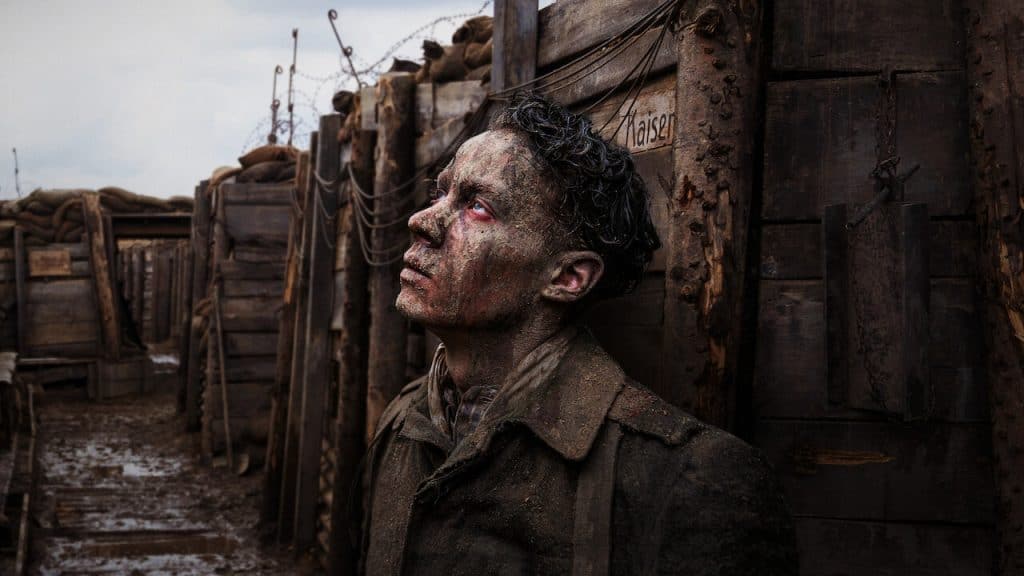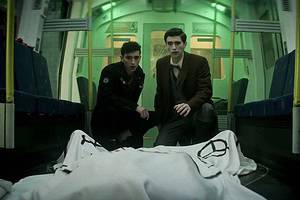[Co-published on When Things Go Pop.]
He wouldn’t survive past dawn.
A commanding officer predicted the fate of new German army recruit Paul Bäumer (Felix Kammerer) at the start of All Quiet on the Western Front. It is both an insult and a premonition. Although Bäumer and his friends enlisted in the First World War for glory and excitement, they have no idea how unprepared they are. Their charismatic leaders don’t disclose how badly the Germans are losing or how they are being unceremoniously cycled onto the battlefield to replace their dead comrades. (Bäumer asks about the name of a dead soldier on his “new uniform; the receptionist claims it’s a sizing error.) The officer suggests Bäumer won’t survive because he is slow and clumsy in affixing his gas mask. The truth is Bäumer, and his fellow recruits aren’t meant to survive in the first place.
Bäumer survives that first night on the front line and many nights after. But at what cost? Adapted from the 1929 novel, All Quiet on the Western Front follows its source’s searing spotlight on soldiers’ piercing trauma. Director Edward Berger recreates the gruesome brutality of life in the trenches with unsparing detail. The battlefield is Hell on Earth, and he doesn’t let you forget it. Mangled and lifeless bodies cover apparent miles of landscape. Severed limbs punctuate nearly every scene at the front. At first, the barrage of violence shocks the system with its punishing rhythm, sequencing, and horror-tinged score. As the film continues, Berger surveys the battlefield through a startlingly pragmatic lens. The miseries aren’t novel anymore or even remarkable. He reflects the devastating commonality of this unthinkable amount of death and destruction.

Berger’s sobering direction on the battlefield emphasizes the surprisingly intimate atmosphere. The film’s emotional thrust comes from the characters, their relationships, and how war profoundly changes everything for them. Just as present as the blood-soaked dirt are the stunned faces caked in grime, their eyes fading with each attack. Berger juxtaposes those images with wisps of human connection: sharing an adrenaline-fueled laugh while stealing a goose or offering comfort as a wife’s letter details the lives left behind. On the front lines, the glimpses of humanity are even more gutting. Through Bäumer’s eyes, we see the razor-sharp switch from cold detachment to aching devastation. Surrounded by bombs and flames, he still finds space to grieve friend and foe. It’s a war on two fronts: the muddy trenches in France and the souls of a generation of men.
As Bäumer and his friends fight for their lives, their souls, and, ostensibly, the country, their leaders eat cake. All Quiet on the Western Front differs from the novel by contrasting the soldiers’ experiences with German officials. Several are detached, discussing the broad implications while dining on fine foods. (Meanwhile, the soldiers fight over rationed stew.) The one man who acknowledges both the war’s hopelessness and its undue harm on the soldiers is Matthias Erzberger (Daniel Brühl), the official leading armistice talks. He rejects the do-or-die mentality of other German leaders and warns his French negotiators that the German people won’t respond well to surrender without mercy. It is slightly heavy-handed and too prescient, but it successfully contrasts the realities of war for the powerful and the powerless. For the latter, your value was equal to how you fit into a just-washed uniform of a murdered comrade.

As Paul Bäumer, Felix Kammerer sits, runs, and crawls through this wartime maelstrom. All Quiet on the Western Front is his first film role, but you wouldn’t know it. He sparks on screen with a raw, crisp energy, especially in the film’s most intense physical moments. He commands your attention, even when the surrounding elements might repel you. As powerful as he is clawing through the trenches, his face, often buried beneath layers of mud, is the most extraordinary part of his performance. Kammerer communicates pain, agony, and even soullessness through his eyes with a shattering clarity that more experienced actors can struggle with. It is a remarkable screen debut, easily one of the year’s best.
One does not simply walk away from war. That harsh truth made Erich Maria Remarque’s novel about World War I so powerful and dangerous when he published it nearly a century ago. (In 1933, the emergent Nazi Party publicly burned the book and its sequel, The Road Back.) All Quiet on the Western Front extends that legacy with its unflinching look at war trauma at its absolute ugliest. Edward Berger rejects the notion that war is a glorious enterprise. He highlights how unprepared governments were to support the young men they asked to sacrifice their lives and humanity. An even harsher truth is that a century later, little has changed.
Adapted from the 1929 novel, All Quiet on the Western Front follows its source’s searing spotlight on soldiers’ piercing trauma.
-
GVN Rating 9
-
User Ratings (0 Votes)
0
A late-stage millennial lover of most things related to pop culture. Becomes irrationally irritated by Oscar predictions that don’t come true.







